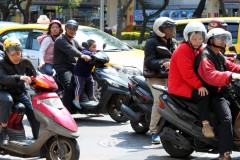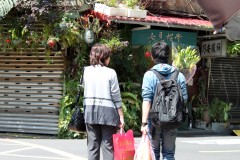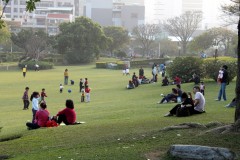
Taiwan. Not to be confused with Thailand, 1,500 miles away, whose culture and geography differ as much as Morocco and Mexico, but don’t worry; before I came here, I didn’t know the difference! It’s an island 99 miles from the southeast coast of China, known as one of Asia’s economic tigers. Food grows abundantly in the rich soil, and hot springs are a healing balm to weary visitors from near and far. Its rugged beauty, lush vegetation, and majestic waterfalls have been attracting expats from all over the world for centuries.
Though occupied by several other cultures, including the Dutch in the 17th century and later the Japanese in the early 20th, Taiwan is predominantly Chinese, the population believed to be 98% Han. When the communists took over mainland China, the nationalists fleeing to Taiwan brought with them historical Chinese artifacts that are now in the National Palace Museum in Taipei. So much was rescued, in fact, that only a small fraction of what exists is able to be displayed in the expansive building!
In recent times, much has been said with regards to families and educational differences between the east and the west. Some may claim that Chinese mothers are “superior,” while others denounce their methods. I have been witness to “Chinese” learning styles in my own classroom, with emphasis on refinement and discipline, hierarchy and respect. Creativity and individualism are also valued, but the other virtues are more heavily emphasized than in the west. My students work hard. And they play hard too! Homa Sabet Travangar notes that Chinese face the same challenge as everyone else in the world – how best to train our children so that they will lead a good life.
After living In Taiwan for seven months, what touches my heart the most is Taiwan’s people. As I wandered the city of Taipei on weekends, it is wonderful to see the amount of time families seem to spend together. As ‘Abdu’l-Baha, the son of Baha’u’llah, said, “The family is a nation in miniature.” Here I see families bonding together, running errands together, doing chores and traveling together daily.

‘Abdu’l-Baha continues. “…The happenings in the family are the happenings in the life of the nation. Would it add to the progress and advancement of a family if dissensions should arise among its members, all fighting, pillaging each other, jealous and revengeful of injury, seeking selfish advantage? Nay, this would be the cause of the effacement of progress and advancement. So it is in the great family of nations, for nations are but an aggregate of families. Therefore, as strife and dissension destroy a family and prevent its progress, so nations are destroyed and advancement hindered.” (Promulgation of Universal Peace, 30 May 1912)
Families around the world want what’s best for each other and strive for unity. After a hard day’s work at Bushiban or four-hour violin practice, children do play, and their parents relax too! Outdoors, it’s hard to find a bit of turf that isn’t frolicked upon!
I often have flashbacks to walking in Hyde Park on a sunny Saturday, but as I pass a picnicker, I can’t eavesdrop on their conversations. My misconceptions about Asian children and adults being pent up for their entire lives behind desks were dispelled. It seems, as my Chinese-American friend pointed out, that “we’re just not that different.” So why do we sometimes believe that we are?

I’m currently living in Taipei and Taiwanese culture really is the same, but different. Family is very important to them. And parents work tirelessly trying to give their children the best possible everything. Yes, Chinese children DO play! and they are creative and will steal your heart in a moment. Anyways, I just wanted to share in your experience.
Cheers, Kira
http://www.facebook.com/onlyintaiwan